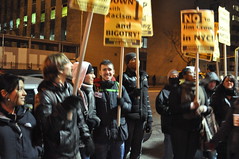 Meredith Hoffman Shaniqua Pippen said that she was denied admittance to the Continental bar by a bouncer who said “Your kind don’t know how to act.” Ms. Pippen joined a demonstration tonight at the bar.
Meredith Hoffman Shaniqua Pippen said that she was denied admittance to the Continental bar by a bouncer who said “Your kind don’t know how to act.” Ms. Pippen joined a demonstration tonight at the bar.Yelling “down with racism,” a group of 30 demonstrators gathered tonight outside the Continental Bar to protest what they said was a pattern of bias by the bar’s owners against African-American patrons.
“This is the first protest,” said Shaniqua Pippen, one of the demonstrators. “And I feel like if we continue more people will come, and something will change.”
Ms. Pippen, who is African-American, said that she was turned away from the bar in June when a bouncer, who is also African-American, told her “Your kind don’t know how to act.”
The owner of the Continental, Trigger Smith, denied that there was anything improper about the way that the bar screened its patrons.
“I’m not going to be politically correct and just let anybody in,” Mr. Smith said in an interview earlier this week. “I look at things in the long run — my bar’s been here 19 years — and I’ll turn away people if they don’t meet my dress code.”
Mr. Smith, who is white, said that patrons were not being turned away because of the color of their skin but because the bar has a policy against admitting patrons who do not adhere to its unwritten dress code.
“It just so happens that more people of a certain minority wear these things than others,” Mr. Smith said. “But I don’t want white trash either, or Jersey Shore boys.”
Mr. Smith said that the bar’s unwritten dress code includes “no baggy, saggy jeans,” and no “open-laced sneakers” if “they go along with a blingy necklace or sideways cap.”
He said that he doesn’t want to admit “frat boy” patrons either, and that he has “the right to run my business” the way he wants “to create a certain vibe.”
Thelicia Covington said that she was not wearing any of the banned “dress code” items when she was turned away from the bar last Friday.
“I was wearing a long dark green stylish coat, dark jeans, flats,” said Ms. Covington, who is 21 and said that she was told by Mr. Smith that he was only allowing “regulars” in the bar.
Ms. Covington said that if Mr. Smith wanted to restrict admittance to certain patrons, he should be more transparent about the bar’s policies and put them in writing.
“He needs to list on his website regulars nights and his dress code. Any policy he has should be universal,” said Ms. Covington. “If you’re not going to be honest with me you can’t be mad at me for saying this is racial discrimination.”
 Meredith Hoffman About 30 people attended tonight’s protest at the Continental bar, Third Avenue and St. Marks Place. The bar’s owner has defended his policy for refusing admittance to some patrons saying, “I’m not going to be politically correct and just let anybody in.”
Meredith Hoffman About 30 people attended tonight’s protest at the Continental bar, Third Avenue and St. Marks Place. The bar’s owner has defended his policy for refusing admittance to some patrons saying, “I’m not going to be politically correct and just let anybody in.”Mr. Smith acknowledged that he has upset people by refusing entrance for years into his bar, but said that it is part of a strategy to keep the bar open in the competitive East Village bar and club scene. He recounted the story of an acquaintance’s bar, which he said closed because “the trendy crowd stopped going” since there was no door policy.
Tonight’s protest was organized by workers with the Answer Coalition, a national advocacy group. Jeanette Caceres, organizer with Answer, said that the group has collected the testimonies of about 30 people who said that they were improperly turned away from the bar.
“We want to give a voice to people to take collective action,” Ms. Caceres said.
She called on Mr. Smith to change the bar’s admittance policies and host multicultural themed nights.
Of the multicultural themed nights, Mr. Smith said, “anyone who would suggest that is from another planet.”
“Let these politically correct and sensitive people open their own bar and I’ll have the last laugh when the doors close either by the city or because it’s out of control,” Mr. Smith said. “You can’t have a free-for-all, especially when alcohol is involved.”



